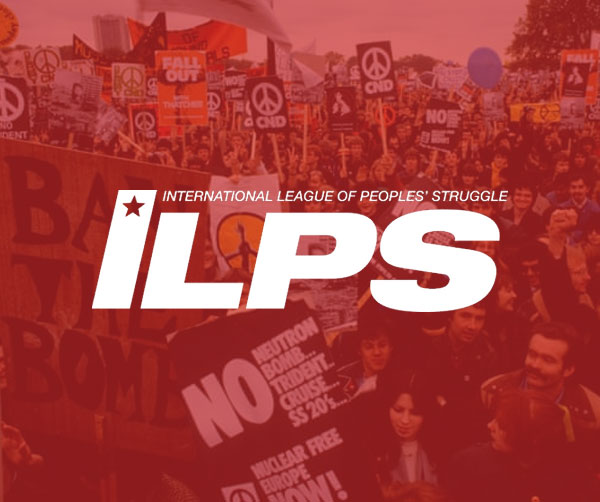FORUM ON INDIGENOUS PEOPLES:
“Stand Up and Fight”
Commission 10’s Evening Event entitled “Stand Up and Fight for Self-Determination and Liberation” featured four speakers from Marawi in the Philippines, West Papua, Manipur and Kawthoolei Karen State in Burma.

Beverly Longid, Global Coordinator of IPMSDL and Katribu International Officer, welcomes the audience of Stand Up and Fight Evening Events.
Sultan Hamidullah Atar’s echoed the peoples’ call for social justice beyond the rehabilitation issues faced by war-torn Muslim City of Marawi. Moro people’s history is filled with rich tradition, but it is also a history full of oppression and denial of freedom, of wars and conflicts, up to the recent ISIS-instigated Marawi Siege in 2017. The inaction by the governments is said to further victimize hundreds of thousands of internally displaced peoples (IDP) including those with legitimate demands for just rehabilitation, democratic participation, and peace building. The Marawi people broadened their struggle and linked with local, national and international platforms amidst continuing
challenges. In closing, Sultan Atar emphasized that militaristic solution alone cannot solve problems of violent extremism but rather a comprehensive approach to address social injustice and root causes of extremism.

Sultan Hamidullah Atar of Marawi shows picture of cases of torture, missing and disappearances in the war-torn Marawi City.
A story about the West Papuan people, its colonization by the Dutch and Indonesia, and the years of struggle it wages for independence is presented by Viktor Yeimo, KNPB international spokesperson. Yeimo described to the audience richness of West Papua – largely covered in virgin rainforests, and large amount of industrial mines and minerals.
This richness is also the main attraction for imperialists, transnational corporations such as mining, palm oil plantations, and corporate agribusinesses heavily protected by thousands of Indonesian military troops.
According to Yeimo’s presentation, West Papua is the most militarized region of Indonesia. West Papua’s richness is not enjoyed by its own people who remains the poorest in all the regency of Indonesia. Even before the Indonesian invasion in 1962, West Papuan have asserted for the recognition and formation of their independent state thru
referendum and armed struggle, shown through interview videos. Also shown through a documentary style clipping of interviews and actual footages are the repression, harassment and threats, arrests, enforced disappearances, massacres and killings by Indonesian military. After the informative West Papua discussion, a heartfelt song made by a political prisoner was sung by the West Papuan delegates.

Viktor Yeimo of KNPB presents the struggle for freedom of West Papuan peoples

West Papuan delegates sing a song of freedom made by a political prisoner
The history of Manipur, a state in North East India just beside Burma, is a history of colonisation and struggle for self-determination. Initially an independent state, it was colonised by the British Empire from 1891 to 1947 and then forcibly annexed by India in 1949. As presented by Jiten Yumnam of Center for Research and Advocacy – Manipur,
Manipur’s forced annexation led to many uprisings among the indigenous peoples of Manipur, leading to the formation of several armed groups seeking independence, such as the Revolutionary People’s Front,the United National Liberation Front Manipur, among others. To maintain its colonial power, India responded militarily to the peoples movement with the enactment of emergency legislations and National Security laws. The result: thousands of extra-judicial killings by military and police still under investigation, enforced disappearances, torture and killings, massacres and sexual harassments. As oppression heighten, movements continue to grow and broaden against development aggression, facilitated by military and police repression, led by Indian and multinational companies abetted by International financial institutions, capitalist & imperialist countries. Videos about the news
reports and updates about recent cooperation between armed liberation movements in Manipur and whole India is shown to contextualize and update on the existing armed struggle waged by the people of Manipur.

Jiten Yumnam of CRAM introduces the geography, culture, issues and struggles in Manipur.
Naw Wahkushee of Karen Women Organization (KWO) told a story of the 70 year of war and struggle of the Karen people for freedom. Ethnically and culturally, Burma (changed to Myanmar by the military government in 1989) has 8 major IP groups including the Karen people, located south of the country near Thailand. After the British colonial
rule in Burma, the Karen is on its way to form its independent state but prevented by the newly formed Myanmar government. The Myanmar military has repeatedly attacked Karen villages to suppress any attempt for autonomy. In defense of land and rights, the Karen armed revolution started resulting to the establishment of independent state “Kawthoolei.” Here, a video of the commemoration of the Karen Revolution is shown.

Naw Wahkushee of KWO shows a presentation of Burma and its diverse IP groups.
Currently, a bilateral peace agreement is entered by the Myanmar government and the Karen National Union (KNU). Large-scale mining operations, mono-crop plantations (rubber and palm oil), illegal logging, mega dams, and road construction are railroaded by the Myanmar government while the peace talks commence. A video presentation is
also shown about the Salween Peace Park which represents the bold initiative of the Karen people to self-strengthen their customary rights over their ancestral territories for increase recognition their contribution to climate change mitigation and nature conservation.
The night’s event is ended with a panel discussion where questions from the audience – mainly centering on topics of revolutions in the respective states and countries discussed, and forms of solidarity that can be forged in the ILPS – is answered by the four presenters with much enthusiasm. Also, to highlight the unity in struggle between peoples from different cultures and nations, a symbolic exchange of
tokens and traditional items is carried out.##

